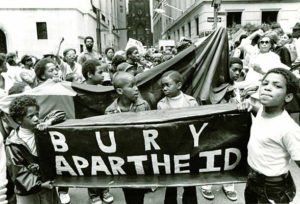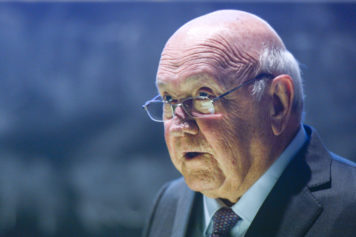About a billion people watched Miss South African, Rolene Strauss, become Miss World 2014 on Sunday, making her the third white woman from South Africa to receive the title.
The 22-year-old contestant was all smiles as the dazzling crown was placed on her head during the final in London, but is there something troubling about her victory?
Despite the contest’s extensive history, only three women from South Africa have ever been given the title of Miss World and all of these women were white.
The first South African winner was chosen back in 1958, Penelope Anne Coelen, and the second, Anneline Kriel, was crowned in 1974.
The contest only recently welcomed its first Black African winner in 2001, crowning Nigeria’s Agbani Darego.
The lack of Black winners in the Miss World competition is troubling on its own, but the presence of only white winners from South African is an eerie reminder of the apartheid history that plagued the country for generations.
This system of racial segregation began with the arrival of Dutch settlers in the 17th century.
Today, many Afrikaners, descendants of these settlers, are rallying for an Afrikaner republic separate from the rest of South Africa.
The constant crowning of only white women from South Africa seems to serve as a physical symbol of the country’s apartheid history and the long-standing presence of colonialism.
After being crowned, Strauss said that she hopes to extend the opportunities that she has been given to other people across the country.
“I am what I am today because of the opportunities I have received and I would love to give others the same opportunities; education, the opportunity to be educated, to make healthy choices and also to live their dreams,” she said.
It’s a platform that some may find ironic considering the gap in opportunities that are afforded to white Afrikaners compared to Black South Africans.
There has typically been a stunning lack of support for many Black Miss South Africa contestants.
When the first Black Miss South Africa, Jacqui Mofokeng, was crowned in 1993, Afrikan media sources immediately started criticizing her.
Some said the competition was “rigged,” while others said her victory was an attempt to “blackwash” South Africa.
Afrikan readers mirrored these sentiments and criticized Mofokeng for her “big bum” and “ugly teeth,” while one caller at an Afrikan radio station blatantly said that a Black woman had no place winning the title of Miss South Africa.

Meanwhile, Miss Hungary, Edina Kulscar, was the runner-up for the coveted title and Miss United States, Elizabeth Safrit, came in third place.
Other winners of the night included Miss Malaysia, who won the talent competition, and a five-person tie in the Beauty with a Purpose competition.
These contestants are recognized for charitable projects they have launched in their own communities.
The five winners of the category were Miss Brazil, Miss Guyana, Miss India, Miss Indonesia and Miss Kenya.
This year’s event also brought global attention to the violence in Central America after Miss Honduras, 19-year-old Maria Jose Alvarado, and her sister were fatally shot last month.
Authorities believe the sister’s boyfriend was behind the shooting and suspect that his motive was nothing more than sheer jealousy after seeing his girlfriend dancing with another man at a party.
In the midst of the killing, Miss World chairwoman Julia Morley said that Strauss and other contestants will be traveling to the country to build a school in the sisters’ honor.
“We hope that it will really start to impress on the people in Honduras that the violence, and hurting people like those two innocent women… maybe they can think again before they take a gun,” she told AFP.


